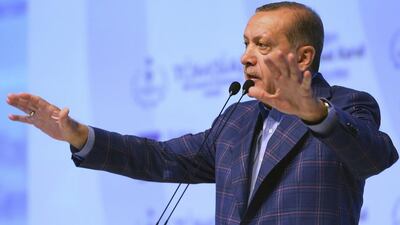On April 25, Turkish fighter jets attacked Iraq’s Sinjar region as part of what the Turkish military cast as a pre-emptive action to avert attacks by the PKK party in Turkey itself.
Recep Tayyip Erdogan, Turkey’s president, has claimed that the PKK is preparing to transform the Sinjar region into “another Qandil”, a reference to the mountain range in Iraqi Kurdistan that the group has long used as a sanctuary throughout its decades-long insurgency against the Turkish state.
The bombing of Sinjar came after four straight days of Turkish bombardments in Qandil and was carried out simultaneously with attacks on the US-backed Syrian Kurdish People’s Protection Units in northern Syria. These are indications that a broad military campaign against these Kurdish group is in the works.
Turkey last month concluded its Euphrates Shield operation, which was originally launched to force ISIL away from its border and prevent Syrian Kurdish forces from linking up their territories. Ankara deemed that operation a success. Now the Turkish media are claiming that preparations are under way to launch Tigris Shield in northern Iraq.
Reportedly the purpose of the new operation is to secure the river banks around the Iraqi border-town of Khabur near PKK positions, presumably in order to disrupt their movements from Iraq into either Syria or Turkey.
According to the Iraqi Kurdish Rudaw news agency, the PKK has started preparing for a major action against them. They believe the Turks might carry it out in coordination with the region’s Kurdistan Democratic Party, one of the two biggest parties in Iraqi Kurdistan, which also opposes the continued PKK presence in Sinjar.
Even though Turkey’s attack on Sinjar killed five Kurdish peshmerga soldiers (rather than PKK fighters), authorities in Iraqi Kurdistan said: “This painful and unacceptable attack on peshmerga forces by Turkish warplanes is a result of the PKK’s presence in and around Sinjar.”
The PKK established its foothold in Sinjar in 2014 when ISIL launched its infamous assault on the Yazidi. After the peshmerga removed ISIL from the city in November 2015, the PKK remained, but pressure mounted on them to leave.
Early in March, a group formed by Iraqi Kurdish authorities made up of Kurdish deserters from the Syrian army and Syrian Kurdish refugees clashed with a Yazidi militia trained by the PKK in the Sinjar region. While this clash between the two proxy groups did not escalate into a full-blown confrontation, it was indicative of the volatile situation.
The PKK is not the only group Mr Erdogan has threatened in the wider northern Iraq region. Turkish troops were sent to the border with Iraq when the Mosul operation against ISIL began last October. He said he would intervene against Iraqi Hashd Al Shaabi paramilitaries if they harmed Turkish interests.
Turkey has maintained forward operating positions for its military against the PKK in northern Iraq for decades. In December 2015, a deployment of additional unauthorised Turkish troops to Bashiqa – where they were training a Sunni militia to fight ISIL – resulted in a diplomatic crisis between Ankara and Baghdad that lasted almost a year. The Hashd and Iraqi Shiite leaders oppose the Turkish military’s presence there.
Ad hoc cooperation between the Hashd and the PKK against Turkey would render any military incursion in northern Iraq much more problematic for Ankara. Karim Al Nuri, the spokesman for the Hashd, said in March that Shiite paramilitaries had some forces in the Sinjar area and had good relations with the PKK there.
“We are not against the presence of PKK forces in Sinjar,” Mr Al Nuri said, “but meanwhile we will not allow them to be a threat to the neighbouring countries.”
Mr Al Nuri’s stance signifies that the Hashd might well support the PKK against a Turkish incursion, but at the same time will oppose them if they use Iraqi territories as a launch pad for attacks into Turkey.
Cooler heads need to prevail among these three sides, otherwise that region could become the centre of yet another destabilising and devastating conflict.
Paul Iddon is a freelance journalist in Erbil, who writes about Middle East politics, affairs and history
On Twitter: @pauliddon

